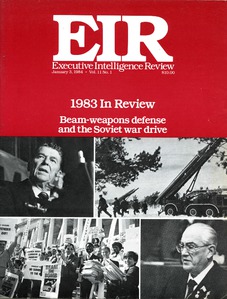Economics
The World Monetary Crisis Turns Against the U.S.
by David Goldman
Paul Volcker drew flight capital into the United States in 1983 while beginning to crush Third World debtors. This only intensified the debt crisis of the West itself, and points toward a potential monetary blow-out.
EIR Uncovers Fed ‘Recovery’ Fraud
by Leif Johnson
The statistical hoaxes that have helped induce President Reagan to reappoint Volcker and to postpone measures to reverse an industrial depression that threatens national security.
LaRouche-Riemann Model Expands To Measure Crash-Program Development Needs
by Lyndon H. LaRouche, Jr.
The concept of relative potential population density is being incorporated into the econometric model in a systematic way.
Scientists Open Path to the Plasma Age
by Marcia Merry
1983’s breakthroughs in nuclear fusion research, immunology, and other essential fields.
The Year in Review
A calendar of the principal international, economic, and domestic events of 1983.
Special Report
Reagan’s Command Decision Was 1983’s Turning Point
by Paul Gallagher
Issue after issue of EIR in 1982 and early 1983 explained the urgent need for an antiballistic-missile beam-weapons defense effort. In March, the President announced that the effort would be undertaken. How policy makers in the U.S. and abroad viewed the transformation is a litmus test for them and for global survival.
Lyndon LaRouche Called the Shots on Strategic Policy in 1983
The Soviets Respond To Beam-Weapons Proposal: Seek a U.S. Strategic Confrontation
by Rachel Douglas
The U.S.S.R.’s declarations that Reagan’s initiative is a casus belli was flanked by their own advanced ABM efforts and by a Soviet order of battle EIR outlines here in the first of a series.
The Revival of the Nazi-Communist Pact: Soviets Foster Worldwide Terrorism
by Thierry Lalevée
Case studies: Mexico’s fascist PAN party and the Khomeini kamikazes.
The Battle for Europe Will Determine If the World Averts Thermonuclear War
by Vivian Freyre Zoakos
How far the Carrington-Kissinger-Genscher axis has come in “decoupling” Europe from NATO, and how support for the beam-weapons doctrine has begun to counter that danger.
International
Ibero-America Bows to IMF in 1983 ‘Financial Malvinas’
by Dennis Small
A step-by-step account of what adds up to a failure of nerve by debtors who could have posed unified terms to the creditors; and a reckoning of the political changes in Mexico, Brazil, Argentina, and Venezuela that shaped the potential, or lack of potential, for a debtors’ cartel.
Asia Becomes a New ‘Arc of Crisis’: The Kissinger Plan versus the LaRouche Plan
by Linda de Hoyos
The economic crisis and the Soviet offensive began to catch up with the still-prosperous ASEAN countries, with Japan, and also with India and China.
Africa Ravaged by Qaddafi and IMF
by Douglas DeGroot
Chad’s de facto partition was as unnecessary as the rest of the havoc inflicted on the underpopulated, underdeveloped continent.
Club of Life Center of Fight for Civilization
by Nancy Spannaus
The counterpole to the Club of Rome expanded exponentially in 1983.
Will the West Legalize Euthanasia?
by Nancy Spannaus
Club of Life U.S. director Nancy Spannaus describes why the Club’s further expansion is urgent.
EIR Interviews in 1983
National
‘Mutually Assured Survival’ Dominates 1983 Policy Battles
by Richard Cohen
The Scowcroft Commission’s campaign to undercut beam weapons and the MX, and the roadblocks thrown against an effective Mideast policy, exemplify the attempts in Washington to put Mr. Reagan under Henry Kissinger’s leadership.
Citizen Candidate Movement Challenges KGB Democrats
by Warren Hamerman
State by state, election by election, the NDPC political action committee founded by Lyndon LaRouche after the Carter renomination disaster of 1980 has taken political ground, as Americans decided that the appeasement wing of the Democratic Party is no longer to be passively tolerated.
Year of ‘Narco-Terrorism’ Sets Stage for Kamikaze Attacks within the United States
by Jeffrey Steinberg
The FBI continued to cover up the threat, but intelligence agencies have confirmed EIR’s longstanding allegation that terrorism is inseparable from the drug traffic’s controllers.
Shuttle Lays Basis for Colonizing Space
by Marsha Freeman
This year’s achievements in the U.S. space program.



